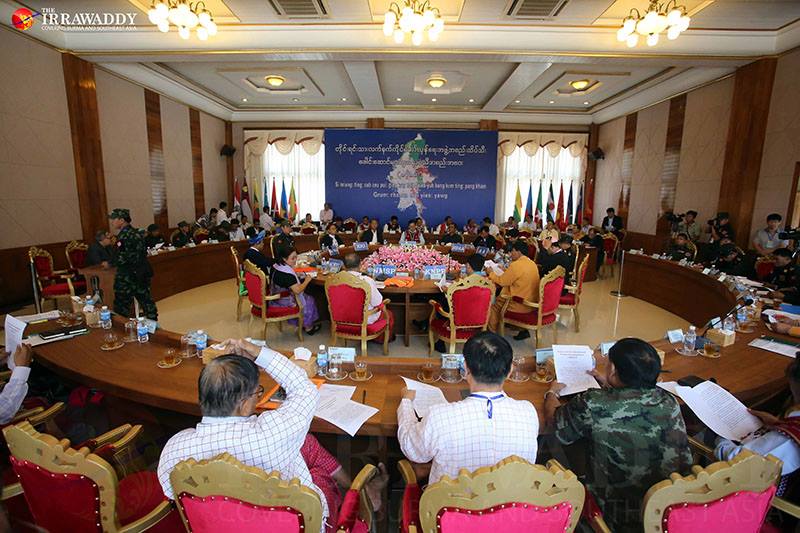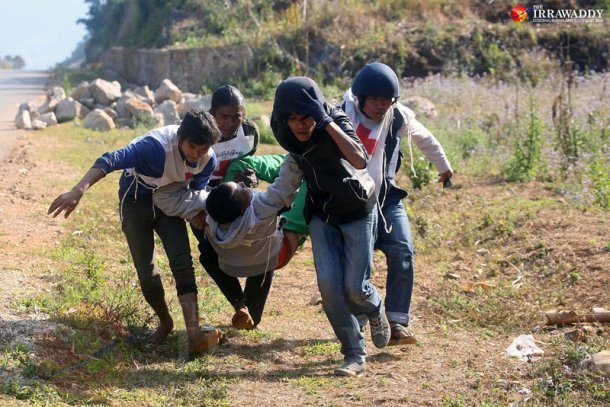Posts Tagged ‘Kokang’ (5 found)
The Burma Government Must Stop Condoning Sexual Violence in Conflict Areas
 On 5 June 2015, Burma Campaign UK released a briefing paper that illustrated the Burma Government’s lack of action towards eliminating sexual violence since it signed the Declaration of Commitment to End Sexual Violence in Conflict (the Declaration) last year. As a signatory to the declaration, Burma agreed to prioritize prevention of sexual violence and to hold all perpetrators accountable to the full extent of the international law, amongst other related commitments.
On 5 June 2015, Burma Campaign UK released a briefing paper that illustrated the Burma Government’s lack of action towards eliminating sexual violence since it signed the Declaration of Commitment to End Sexual Violence in Conflict (the Declaration) last year. As a signatory to the declaration, Burma agreed to prioritize prevention of sexual violence and to hold all perpetrators accountable to the full extent of the international law, amongst other related commitments.
Unfortunately, not only has Burma ignored its commitments to the Declaration, it is also actively violating it, as cases of rape and sexual assault continue to emerge from conflict areas. According to Burma Campaign UK, “Given the widespread nature of sexual violence by the Burmese Army, the refusal to act, and now the violation of commitments made in the Declaration, it can only be concluded that the use of rape and sexual violence by the Burmese Army is condoned at the highest level of the government and the military.” […]
• • •Familiar Blocks on the Road to Peace
 As the ethnic armed groups’ summit in Panghsang, Shan State concluded on 6 May 2015, familiar obstacles still loom large in the peace process. Namely, the 2008 Constitution, continued attacks and human rights violations committed by the Burma Army, and a lack of trust. Various commentators and organizations, including Burma Partnership, sounded words of caution after the over excitement caused by the agreement in principle of the draft nationwide ceasefire agreement (NCA), and those words of caution are salient today as peace remains out of sight.
As the ethnic armed groups’ summit in Panghsang, Shan State concluded on 6 May 2015, familiar obstacles still loom large in the peace process. Namely, the 2008 Constitution, continued attacks and human rights violations committed by the Burma Army, and a lack of trust. Various commentators and organizations, including Burma Partnership, sounded words of caution after the over excitement caused by the agreement in principle of the draft nationwide ceasefire agreement (NCA), and those words of caution are salient today as peace remains out of sight.
The summit in Panghsang, territory controlled by the United Wa State Army (UWSA), brought together 12 major ethnic armed groups for talks that lasted six days. Groups that were present included those bearing the brunt of Burma Army offensives the past few weeks, the Kachin Independence Organization (KIO), the Ta’ang National Liberation Army (TNLA), the Arakan Army (AA), and the Myanmar National Democratic Alliance Army (MNDAA). In fact, as talks were being held, the Burma Army attacked Kachin Independence Army (KIA) positions with airstrikes. It is not just the armed groups themselves who are bearing the brunt of attacks, but horrific human rights violations committed by the Burma Army on fleeing ethnic Kokang villagers, such as extrajudicial killings, including beheadings, are creating deep-seated fear among those who have been displaced by the conflict, but who are being pressured to return by Burma authorities […]
• • •Walking into Beatings, Running Away from Gunfire
 This week has seen the various organs of the state being employed to oppress and commit violence against students marching for education reform, workers striking for their rights, and ethnic nationality Kokang fleeing conflict. Thus we have seen the use of guns, thugs, repressive laws, and police brutality, exposing not just the range of the tools of government subjugation of its people, but the depths to which it will go to maintain power.
This week has seen the various organs of the state being employed to oppress and commit violence against students marching for education reform, workers striking for their rights, and ethnic nationality Kokang fleeing conflict. Thus we have seen the use of guns, thugs, repressive laws, and police brutality, exposing not just the range of the tools of government subjugation of its people, but the depths to which it will go to maintain power.
In downtown Rangoon on 5 March, 2015, around 200 people gathered to show their solidarity with the student marchers, currently barricaded by police in the town of Letpadan, 85 miles from Rangoon. This solidarity demonstration was violently broken up, not just by police, but by a gang of thugs, employed by the police to create disturbances and assault the protestors. These thugs, wearing red armbands with the word ‘duty’ are reminiscent of Swan Ah Shin group, who were used by the previous military regime in the Depayin Massacre in 2003 in which members of the National League for Democracy (NLD) were murdered, as well as the 2007 Saffron Revolution. Eight protestors were also detained overnight, including three members of the 88 Generation Peace and Open Society group. Meanwhile, the 100 students barricaded in Letpadan remain, with 500 police officers surrounding them, as the government refuses to allow them to continue their march to Rangoon.
• • •Shooting, Killing and Torture of Civilians by Burma Army During Kokang Conflict
Interviews by SHRF provide evidence that during the current conflict in the Kokang area, Burma Army soldiers have been indiscriminately shooting at civilians, causing injury and death; have used civilians as hostages for ambush; and have also tortured civilians on suspicion of supporting the Kokang armed resistance group […]
• • •Update of Humanitarian Situation in Northern Shan State
After the 1989 ceasefire agreement between the Myanamr Tatmadaw and Myanmar National Democratic Alliance Army ( MNDAA ), fresh fighting erupted on 9 February 2015 in the Kokang self-administered zone of northeast Shan State, Myanmar […]
• • •








 All posts
All posts